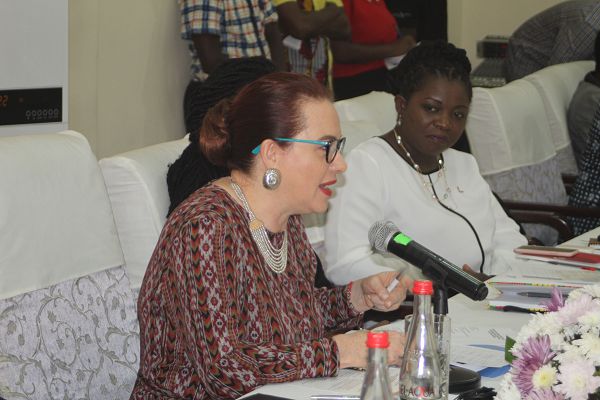
Ms Maria Fernanda Espinosa Garces (left), the President of the 73rd session of the United Nations General Assembly, speaking at the meeting. Picture: GABRIEL AHIABOR
The United Nations has expressed concern about the deepening inequality gap in the world.
Madam María Fernanda Espinosa Garcés, President of the 73rd Session of the United Nations General Assembly said despite prolonged periods of growth, wealth had not trickled down, declaring that ‘inequality is deepening’.
She said it was sobering to think, for example, that just 26 people own as much as the 3.8 billion who make up the poorer half of humanity- only 26 people.
“Governments are less able to provide a credible guarantee to their citizens. Today, issues that were traditionally domestic – job creation, for instance – increasingly have a global dimension. To adapt the saying: global challenges are like a baobab tree. No one government can embrace them alone,” she said.
Mada Espinosa said this in her presentation at the Council on Foreign Relations, Ghana, public lecture series in Accra.
Madam Espinosa, who is on a four-day visit to Ghana, spoke on theme “Responding to global challenges in a fast-changing world: the case for strengthening multilateralism”.
With regards to the health of our multilateral system, Madam Espinosa said these trends and challenges had produced a crisis of confidence in governments and institutions.
She said justified concerns about unchecked globalisations had mutated into a backlash against the very principles that give power to the people, such as human rights, gender equality and social justice.
“We are seeing a rise of nationalist sentiment, in extremism, in unilateral approaches, in attacks of international laws and norms,” she said.
She said this was creating a difficult environment for the decisions they need to take in the coming months and years.
“Just when we need multilateralism more than ever, global cooperation is being questioned and, even undermined in some quarters.
“We know from past, painful experience that erosion of the social contract, and erosion of international cooperation, leads to war.
“And we know that this time, war could wipe us out – through nuclear weapons, but also by wasting time that should have been spent on climate change for example.”
She said global growth was slowing, markets were volatile and in many countries, deficits remain too high to stabilize.
She pointed out that the remedial action taken during the last financial crises had not been enough; stating that the International Monetary Fund had warned that storm clouds are gathering again.
She said there was lingering public resentment: that the banks were saved at the expense of the average worker.
She said the whole-sale transformation they need – in economic policy and governance – was challenging to pursue politically, at least for now; however, in the meantime, they must do more to promote evidence-based action, rather than policies driven by ideology.
On climate change Madam Espinosa said “We know we face a “hard deadline” on carbon emissions and we know, in broad terms, what we need to do we have the science, we have the knowledge, we have the technology, we know what to do. But there are many pathways to zero carbon – we are unlikely to have definitive answers on which to prioritize in the required time-frame.”
She said their best bet, therefore, was to focus on the most transformative, scale-able steps they could take immediately to tip the scale.
Mrs Mary Chinery-Hesse, Chancellor, University of Ghana, who chaired the function, mentioned that the adoption of the Universal Declaration of Human Rights as a benchmark for the protection of fundamental human rights, the promotion of peace and security across the world, the adoption and promotion of the Millennium Development Goals and now the Sustainable Development Goals were all enviable accomplishments by the UN General Assembly.
Mr Daniel K. Osei, President, Council on Foreign Relations, Ghana, said there was the need to adequately prepare the youth for the future.
Source: GNA























